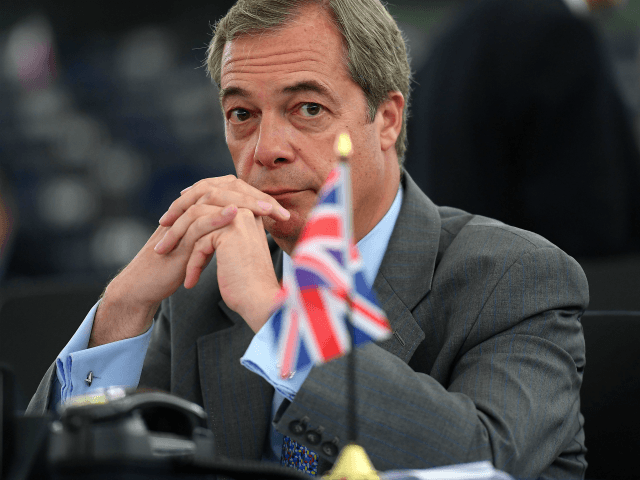Nigel Farage has warned that the European Union will attempt to use the Chinese coronavirus crisis to “trap” the United Kingdom into an extended Brexit transition period.
The Brexit Party leader said that Michel Barnier, the EU’s top Brexit negotiator, is trying to create a distinction between the “political Brexit” that was secured by the British people on January 31st, and an “economic Brexit” that is set to occur when the transition period ends in December.
“Politically, the UK gave up its small amount of influence within European institutions at the end of January, but the EU retained the ability to impose new directives and laws over us, which we now have no say in deciding,” Mr Farage wrote.
“The deadline for extending is in just two months, on June 30, and Mr Barnier, I fear, is using this new distinction to ready the ground for yet another delay, after which the British people will be told they have had their ‘political Brexit’ when we are, in fact, in a worse position than before,” Farage warned.
Mr Farage said that should Boris Johnson’s government capitulate to another delay of Brexit, the country will be “stuck” in the “sinking ship” that is the European Union precisely at the same time that the UK will be seeking new trade deals in order to stimulate a “post-Coronavirus recovery”.
“The Coronavirus crisis presents real challenges but delaying Brexit again and breaking more promises to voters will only unsettle businesses with added uncertainty. We have already begun to negotiate with new, global trading partners such as the US and Australia, who are keen to strike a deal quickly, and they must be prioritised over an inflexible and power-hungry EU and it’s stalling economies,” Farage continued.
Mr Farage went on to accuse Germany, which is set to take the presidency of the European Council in July, of conducting a power grab. The Brexit Party leader pointed to reports that German Chancellor Angela Merkel is seeking to impose minimum tax rates on member states within the EU as well as the establishment of a European Union healthcare system.
“Europe is pushing ahead with the formation of a superstate and this process is only set to accelerate during the looming six months with Germany as the top dogs. Any delay to our departure could see the UK sucked into these measures, which are precisely what we voted against in the referendum, nearly four long years ago,” Mr Farage said.
Finally, Mr Farage pointed to the growing divisions within the bloc over the coronavirus crisis, citing the bloc’s failure to provide any “serious aid” to the hardest-hit member states such as Spain and Italy. He went on to warn that the coronavirus could lead to “another devastating Eurozone collapse which we would become caught up in”.
“Let’s leave this sinking ship — politically and economically, as Mr Barnier would say — on time and on World Trade Organization rules if we have to,” Mr Farage concluded.
While anti-Brexit activists are keen to spin coronavirus as a pretext for cancelling Britain’s continued withdrawal — arguing the pandemic would intensify the economic impact, others make clear the opposite is true. German associate editor of the Financial Times — a fanatically pro-EU newspaper — Wolfgang Münchau points out with coronavirus lockdown in place, the worst nightmares of Europhiles have already come true anyway, and Brexit couldn’t make it worse.
As Breitbart London reported in April, Mr Münchau observed:
When Brexit talks resume, the UK government should be emboldened by recent events. Before the lockdown, the calculation of the costs and benefits of a hard Brexit looked different to how it looks now. These costs were never easy to quantify because they depend to a large extent on how companies adjust. But whatever these costs would have been, many of them have already been incurred. Lockdown has in any case already seen countries all over Europe tear up the fundamental principles of the single market, such as freedom of movement of people and of non-essential goods. Borders have been closed. Some countries have imposed a state of emergency and there has been a de facto suspension of EU fiscal and competition rules. The EU’s red tape is being cordially ignored.
So if Brexit talks do not end in a deal, it would be less of a jump to adopt the rules of the World Trade Organisation now than it would have been before. Most of the supply chain disruptions have already occurred. A WTO trading relationship would mean Britain applying tariffs (averaging 4 per cent). In normal times, this would have some noticeable economic impact: prices would rise and the volume of many imports and exports would fall. But compared to the great lockdown, the effect of a WTO Brexit is small. If the two were to be folded together, the economic effects would be hard to disentangle.
Follow Kurt on Twitter at @KurtZindulka

COMMENTS
Please let us know if you're having issues with commenting.